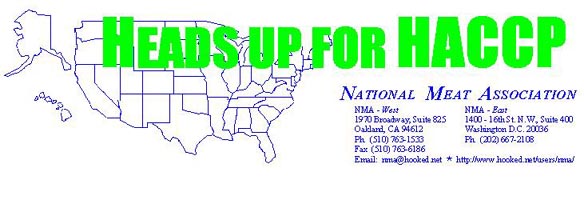

Edited By Jeremy Russell
December 1, 1997
WHERE DID HACCP COME FROM?
BY ROSEMARY MUCKLOW NMA EXECUTIVE DIRECTOR
The pathway to the HACCP system started in 1959 when Pillsbury Company was asked to produce a food that could be used under zero gravity conditions in the space capsules. The challenge of such an endeavor is to create as close to 100% assurance as possible that no contamination is present, sickness in zero gravity situations being very dangerous. The concept and reduction to practice of the Hazard Analysis and Critical Control Point (HACCP) system was directly related to the Pillsbury Company�s projects in food production and research for the space program. The basics were developed by the Pillsbury Company with the cooperation and participation of The National Aeronautics and Space Agency (NASA), the Natick Laboratories of the U.S. Army, and the U.S. Air Force Space Laboratory Project Group.
Since that time, HACCP principles have been discussed, nationally and internationally, by scientists and public health officials in their revision of food safety requirements. FSIS, in its Final Rule, published in the Federal Register on July 25, 1996, states:
The FSIS proposal to require adoption of HACCP in meat and poultry establishments was widely endorsed by comments from large and small businesses, the scientific and public health communities, consumers, and public interest organizations. Commentators strongly supported the concept that meat and poultry establishments should systematically build science-based food safety measures into their production processes following the seven HACCP principles developed by the National Advisory Committee on Microbiological Criteria for Food.... FSIS has concluded that HACCP-based process control, combined with appropriate food safety performance standards, is the most effective means available for controlling and reducing harmful bacteria on raw meat and poultry products. HACCP provides the framework for industry to set up science-based process controls that establishments can validate as effective for controlling and reducing harmful bacteria... Science based process control, as embodied in HACCP, and appropriate performance standards are inextricably intertwined in the Agency�s regulatory strategy for improving food safety.
National Meat Association still has available copies of the Final Rule and is pleased to make them available to those who send a self-addressed, stamped ($3.00) envelope to Lashonda Lattier at NMA. Additional materials that are available about HACCP may be obtained from the International HACCP Alliance (see inset) and HACCP Training materials from training providers, including the Food Processors Institute (202-393-0890), the HACCP Consulting Group (703-534-0183).
WHAT IS A PARADIGM SHIFT
BY NMA
Regulators and Industry often refer to the changes occurring in the way meat and poultry inspection is conducted as a "paradigm shift." NMA�s Ken Mastracchio, Director of Regulatory Issues, and himself a meat inspector for seven years after graduating from college, said that, a "paradigm" is defined as a pattern, example or model. Another nationally-recognized author on the subject says that "paradigms are sets of rules and regulations that do two things: First, they establish boundaries; and second, these rules and regulations tell us what to do in order to be successful within those boundaries." In other words, says Ken, a paradigm provides the framework or parameters in which an individual or a society can successfully interact with their environment. It also acts as a filter that selectively screens out information that does not conform to the rules and regulations of the paradigm. An example of an obsolete paradigm is that the world is flat and anyone who sailed too far would fall off the edge into oblivion. A paradigm shift occurred when people recognized that the world was round and adjusted their thinking accordingly.
A paradigm shift is now occurring. The transition from traditional, so-called "command and control" inspection techniques to a HACCP-based system is being made.
A copy of NMA�s Resource: FSIS�s Paradigm Shift written by Ken and published in November 1996 is available on request. Just send a self-addressed, stamped (32�) envelope to NMA, attention Jeremy Russell, for a copy
�